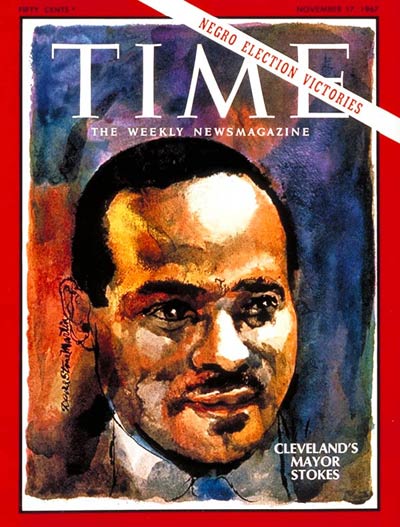
Milestone moments do not a year make. Often, it’s the smaller news stories that add up, gradually, to big history. With that in mind, in 2017 TIME History will revisit the entire year of 1967, week by week, as it was reported in the pages of TIME. Catch up on last week’s installment here.
Cleveland’s newly elected Mayor Carl Stokes made the cover of TIME this week, but he was only one example of a striking phenomenon, embodied in Gary, Ind., by Richard Hatcher and in Boston by Kevin Hagan White. In major U.S. cities, citizens were turning out to vote for candidates who represented surprising leaps in civil-rights progress for their cities. And in Cleveland and Gary, those mayors were in fact African-American themselves. As Martin Luther King Jr. put it, the election results were a “one-two-three punch against backlash and bigotry.”
Though many white voters still voted along racial lines, supporters of equality celebrated the use of the ballot box as a non-violent means of making change in the United States. The victories “answer at least in part the growing demands of moderate Negro leaders like the Urban League’s Whitney Young to ‘give us some victories’ to offset the revolutionary preachings of black extremists,” as TIME put it.
While TIME’s coverage of the results was not without its own prejudice — noting the “sophistication and professionalism” of the Stokes and Hatcher campaigns without hiding the extent of the low expectations behind those words — the magazine laid out the many obstacles the three victors had to overcome to reach this point, from the party machinery of Gary to the problems with vote counting in Cleveland. Nor was the magazine shy about praising these events as a good thing for the entire country:
What has already happened, of course, is that two big American cities have elected Negro mayors while a third rejected racism as an overriding issue. Both Negro candidates received vigorous support and vital votes from white liberals even though both owe their victories primarily to a unified Negro vote. After three summers of violence in the cities, this in itself is a reassuring portent. It will be up to Mayors Stokes and Hatcher to demonstrate that the only constructive — and indeed, tolerable — force in American politics is ballot power.
Outsider candidate: Though this issue was still processing the off-year elections of 1967, the big presidential contest of 1968 was on its way — so the national news section took note of Sen. Eugene McCarthy’s fledgling candidacy as a pro-peace figure on the Democratic side, at a time when the option of a sizable anti-Johnson vote was starting to seem worth considering.
Our automated future: In an essay that functioned as a counterpoint to the world’s celebration (or condemnation) of the 50th anniversary of Soviet communism, TIME considered what had happened to capitalism over the prior half-century. Of note to today’s readers may be the amount of space the essay devotes to the positive impact of time-saving devices on the daily lives of Americans, painting a vivid picture of the 1960s housewife whose appliances did so much of her work that she spent afternoons at the theater and evenings watching television. In fact, one famous 1974 study found that housewives spent about as much time on housework each week as they had back in the 1920s — and while today’s American mothers spend substantially less time doing housework than their 1960s precursors did, a lot of that lost time is spent working outside the home, not going to matinees.
Fake news: A hoax had stirred up angst among many American newshounds, after writer Leonard C. Lewin claimed that he had received a leaked copy of a report from a secret group brought together by the U.S. government to analyze what would happen if the world actually achieved “permanent peace.” Finding that war was in fact beneficial to the economy and to the general order of the world, the report offered suggestions for conflicts to fill the gap, running from purposeful “gross pollution of the environment” to the announcement of “giant space-research programs with largely unattainable goals” to distract citizens. Though it was quickly clear the report was satire, it took years for Lewin to confess that he was its author.
Top stars: In the cinema section, TIME reported the news of Box Office magazine’s new ranking of the top stars in Hollywood. Among male actors, the top box-office draws were Richard Burton, Paul Newman, Lee Marvin, John Wayne, Sidney Poitier, Sean Connery, Jack Lemmon, Cary Grant, Michael Caine, Steve McQueen, Dean Martin and Dick Van Dyke. For women, it was Julie Andrews, Elizabeth Taylor, Audrey Hepburn, Jane Fonda, Sophia Loren, Shirley MacLaine, Julie Christie, Doris Day, Hayley Mills, Natalie Wood, Debbie Reynolds and Sandy Dennis.
Great vintage ad: Here, from Delta, comes a precursor to print-at-home or e-ticket technology.
Coming up next week: Britain’s Moment of Crisis
More Must-Reads from TIME
- Cybersecurity Experts Are Sounding the Alarm on DOGE
- Meet the 2025 Women of the Year
- The Harsh Truth About Disability Inclusion
- Why Do More Young Adults Have Cancer?
- Colman Domingo Leads With Radical Love
- How to Get Better at Doing Things Alone
- Michelle Zauner Stares Down the Darkness
Write to Lily Rothman at lily.rothman@time.com